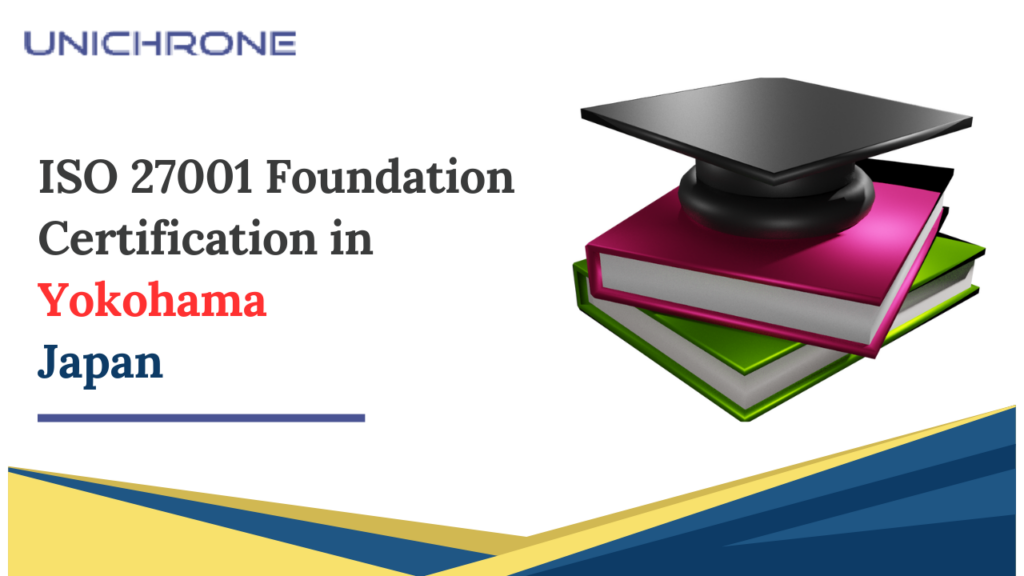In today’s digital age, information security is paramount for organizations to protect sensitive data and maintain the confidentiality of their information security systems. The ISO 27001 Lead Auditor Certification Training in Yokohama, Japan, offers professionals a gateway to professional growth through proper IT governance. This comprehensive training equips aspiring ISMS Auditors with essential skills, enabling them to conceptualize, conduct, and document audits effectively. In this article, we will delve into the significance of ISO 27001 Lead Auditor Training and explore how ISMS Auditors adopt a holistic approach beyond the checklist to safeguard organizations against evolving cyber threats.
ISO 27001 Lead Auditor Certification Training: Unleashing Professional Growth
The ISO 27001 Lead Auditor Certification Training in Yokohama is more than just a certification; it is an opportunity for individuals to expand their horizons and nurture their careers. Those aiming to excel in ISO 27001 Lead Implementer job interviews can greatly benefit from this training program.
The ISO 27001 Lead Auditor course covers a wide range of skills, empowering Lead Auditors to assess the effectiveness of Information Security Management System (ISMS) audits. Certified Lead Auditors become an indispensable asset to organizations, ensuring the confidentiality and integrity of their information security systems.
Gaining Command over ISMS Implementation
Successfully clearing the ISO 27001 Lead Auditor Exam in Yokohama, Japan, opens a world of opportunities for individuals. Certified ISMS Auditors gain command over ISMS implementation, obtaining valuable insights into managing corrective actions and driving continual improvement within organizations.
The training equips aspirants with the ability to define objectives tailored to cater to organizational cybersecurity requirements. By doing so, certified Lead Auditors reinforce information security practices, minimizing the risk of potential breaches and data compromises.
The Holistic Approach of ISMS Auditors
ISMS Auditors adopt a holistic approach to assess an organization’s information security framework. Rather than relying solely on checklists, they analyze the overall effectiveness and alignment of the ISMS with the organization’s objectives. The holistic approach involves several key elements:
- Risk-Based Auditing: ISMS Auditors prioritize risk-based auditing, identifying critical areas where information security risks are more likely to occur. This ensures that resources are allocated appropriately to mitigate potential threats effectively.
- Understanding the Business: ISMS Auditors familiarize themselves with the organization’s business processes, goals, and objectives. This understanding allows them to assess how information security aligns with the organization’s strategic direction.
- Continuous Improvement: Beyond compliance, ISMS Auditors emphasize the importance of continual improvement in information security practices. They encourage organizations to adapt their strategies to address new and emerging cyber threats.
- Data Analysis: ISMS Auditors analyze data and evidence collected during audits to draw meaningful insights. This data-driven approach enables them to provide valuable recommendations for enhancing information security.
- Communication with Stakeholders: Effective communication with stakeholders, including management and employees, is vital for ISMS Auditors. Clear and concise communication ensures that audit findings and recommendations are well understood and acted upon.
- Focus on People and Processes: ISMS Auditors acknowledge that information security is not just about technology but also about people and processes. They evaluate how employees handle information and how robust the processes are in protecting data.
The Impact of Holistic Auditing
The holistic approach of ISMS Auditors yields several benefits for organizations:
- Comprehensive Risk Management: By prioritizing risk-based auditing, ISMS Auditors ensure that information security measures address the most critical risks to the organization.
- Strategic Alignment: Understanding the organization’s business enables ISMS Auditors to assess how well information security aligns with its strategic objectives.
- Proactive Security Measures: Continuous improvement fosters a culture of proactive security, where organizations are better prepared to tackle emerging cyber threats.
- Informed Decision-Making: Data analysis allows ISMS Auditors to provide evidence-based recommendations, facilitating informed decision-making by management.
- Cultivating a Security Culture: By focusing on people and processes, ISMS Auditors help cultivate a security-conscious culture within the organization.
Conclusion
The ISO 27001 Lead Auditor Certification Training in Yokohama unlocks a world of opportunities for professionals seeking growth in the realm of IT governance and information security. ISMS Auditors play a vital role in safeguarding organizations against cyber threats by adopting a holistic approach to auditing.
Beyond the checklist, ISMS Auditors prioritize risk-based auditing, understand the business, emphasize continual improvement, and analyze data to draw meaningful insights. Their focus on people and processes ensures that information security is not just a technical endeavor but also a cultural one.
By embracing the holistic approach of ISMS Auditors, organizations can bolster their information security measures and fortify their defenses against ever-evolving cyber risks. In a digital landscape where data protection is of utmost importance, the role of ISMS Auditors becomes increasingly indispensable for a secure and resilient future.


